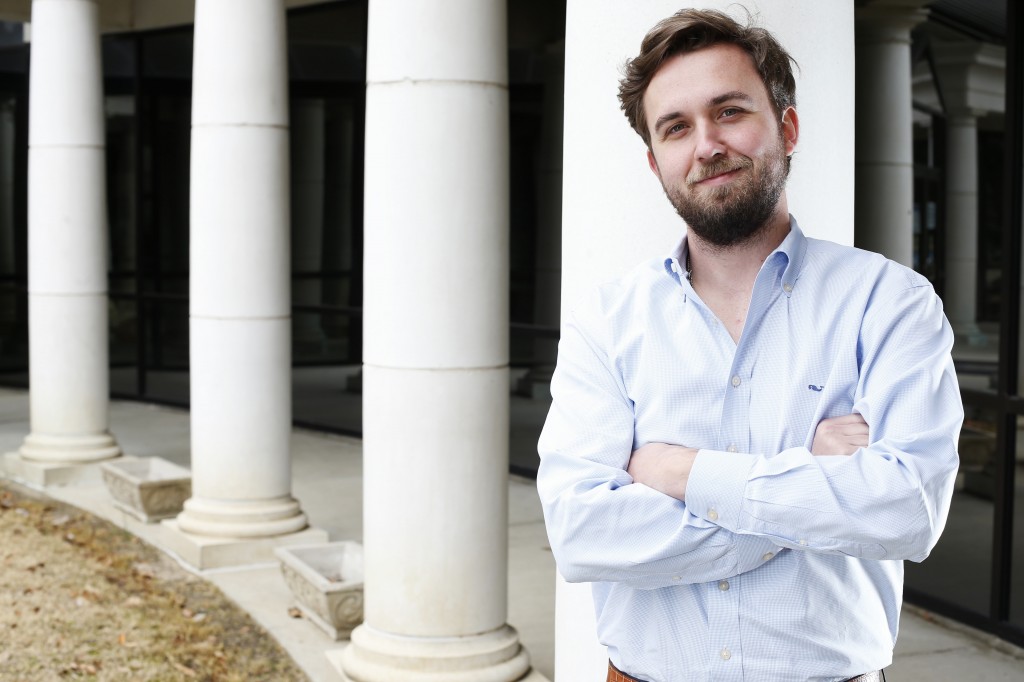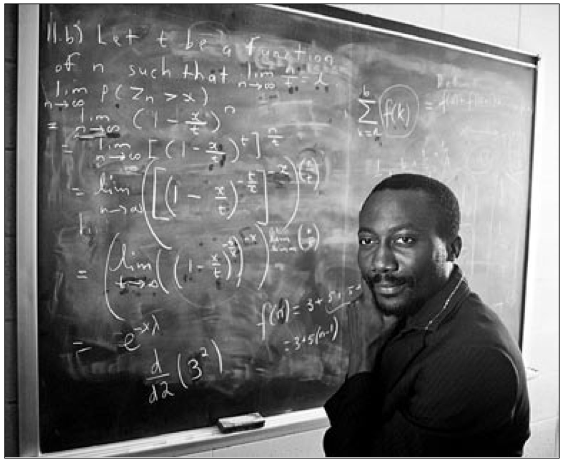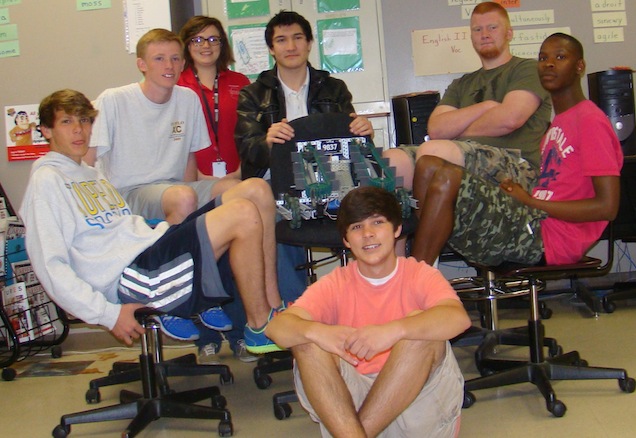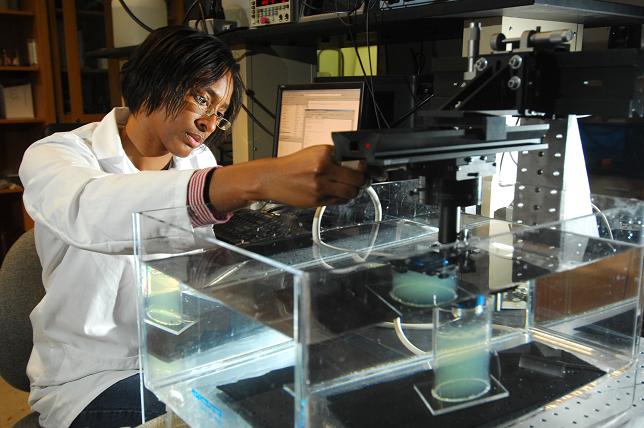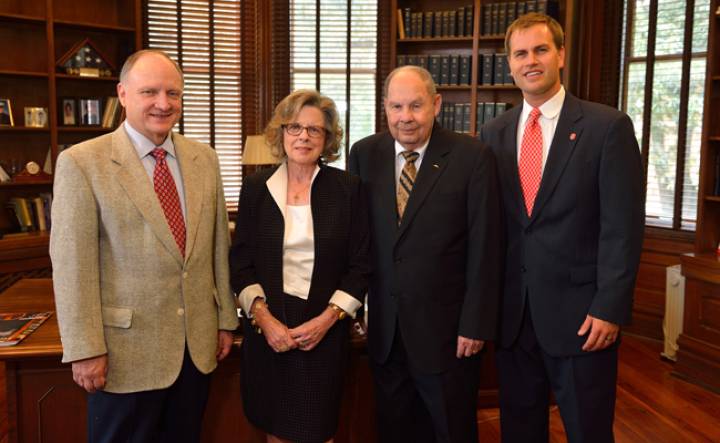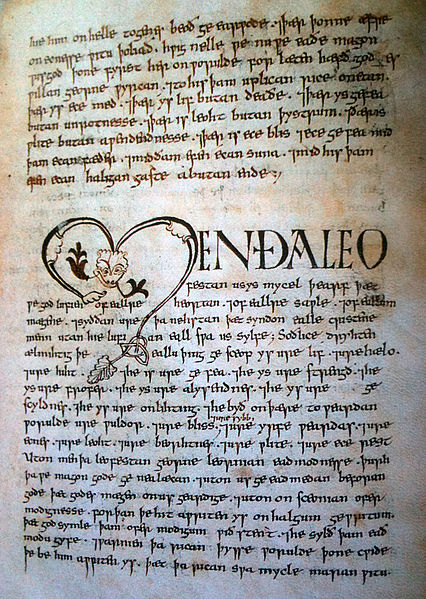BY LUCY SCHULTZE, Courtesy of The Oxford Eagle
April 3, 2014
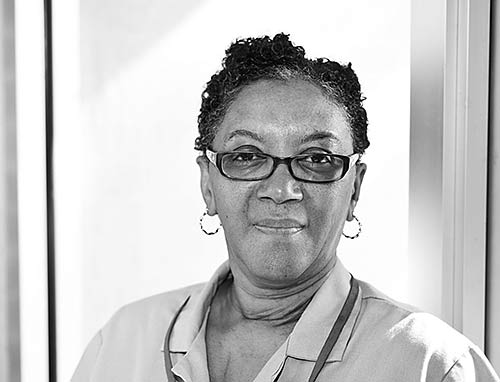
Shelia Lewis | Photo by Bruce Newman, Courtesy of The Oxford Eagle
In the wee hours of the morning, the quiet halls and empty classrooms of Hume Hall are filled with the peaceful refrains of “Take Me to the King” and “He Will Make it All Right.”
Gospel melodies make the hours pass more pleasantly for custodian Sheila Lewis, who has been tending this building for more than a decade. While she refrains from singing strongly enough to really make those empty halls resonate, she shares her vocal encouragement with her co-worker and best friend, Sandra Phillips, as she works nearby.
The two women share the 3-11 a.m. shift at Hume Hall, home of the University of Mississippi Department of Mathematics. The building is entirely theirs for the first five hours or so. As students and faculty file in, Lewis enjoys greeting familiar faces and is never shy with a hug.
A native of Etta, Lewis graduated from West Union High School and moved to Abbeville when she married. She spent more than 25 years on the line at Emerson Electric Co., which shut down in 2002. She next worked at Whirlpool Corp. — but got ahead of layoffs before that plant’s closure and took a job on campus.
According to Lewis’ supervisor, Scott Steen, the university was lucky to snatch up good workers like Lewis and Phillips, who had also worked at Emerson.
Off hours, Lewis rests at home and makes the drive to her home church in Etta, Union Hill Missionary Baptist Church, her chief venue for sharing her talents in gospel music.
Lewis has three grown children: Michael Lewis of Oxford, who also works for the Physical Plant Department; Tanisha Lewis of Dallas and Dexter Lewis of Jacksonville, Fla. She has six grandchildren.
The Oxford EAGLE visited with Lewis, 54, and Phillips in the basement stairwell of Hume Hall as students and faculty stepped through on their way to class.
You must know every corner of this building.
“Pretty much. When I first started, I was in Conner, but I didn’t stay over there very long. I been here ever since. I plan to work as long as I can.”
Do y’all have a routine that you follow each day?
“We come in and get our supplies we gonna clean with. We do the same floor; I’m on the right, and she’s on the left. We do the classrooms, then all the offices and the kitchen area.
“She’s on that side of the hall, and I’m on this side of the hall. We meet up, and I’ll have a little more to do on my side, so we work together to get it all done. We don’t let one person do all the work. And singing, that get us through the day.”
In what way?
“Well, I don’t sing out loud, just kind of to myself. Like, we’ll come in and need to get motivated to do the things that we need to do. So I just sing and ask the Lord to let me make it through the day.”
What’s your relationship like with the people who work in this building?
“When they come in, we encourage them, and if they’re sick, we try to help them. I just love people, and I try to treat them well. I say, ‘If you need anything, just let us know.’ “The students, they on their phones. But some of them will speak to you and greet you. The faculty members, they talk to us every day. We try to encourage them — ‘It’s gonna be OK’ — if they’re having a bad day.”
What’s it like to share this job with someone you’ve worked with for so long?
“We’re best friends. She’s great.
“We try to come to work for each other. We try not to miss days. And even if we need to, we’ll come in and work for a little while. We try not to make our job harder for each other.”
It must have been a big change for you to come here after working in an industry setting. Do you miss it?
“Kinda. No, not really. I like this.”
“It was strange at first, I guess — being at a different place and being by yourself. ‘Cause at Emerson, you had people around all the time. Like when we started at 7 o’clock, there’s people all the time. At 3 in the morning, you don’t have anybody else around.”
Do you mind the hours?
“I like the hours. I usually try to take a nap during the day when I get home. I go to sleep about 6 or 7, depending on what I do in the evening.
“And the job, I mean, it’s just maintaining and we do what we need to do. We do the job.
“But I pray when I leave for work, and I pray when I get to work, and I pray when I get home. Just, ‘Help me get through the day.’ And I say, ‘Thank you for this day,’ when I get done with this job.”
I appreciate your visiting with me.
“To tell you the truth, I been trying to get out of this since Scott said y’all wanted to do this. I’m not a big person to talk about what I do.
“I think actions speak louder than words, I guess.”
Whose story would you like to hear? Suggest a subject for “A Conversation With…” by calling 234-4331 or sending an email to lucy.schultze@oxfordeagle.com.
